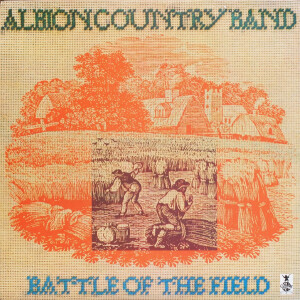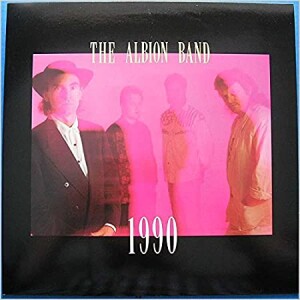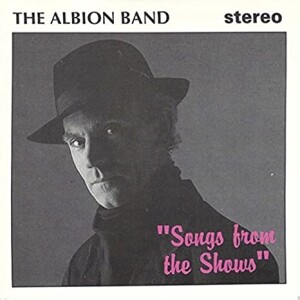 Irene Jackson Henry wrote this review for Folk Tales.
Irene Jackson Henry wrote this review for Folk Tales.
“There’s a country band playing hand-me-downs.”
The tangled vine that is the family tree of English folk-rock music has several long stems that wind through it, touching many other stems and branching wildly. One of these is Ashley Hutchings. As Ashley “Tyger” Hutchings, he was a founding member of Fairport Convention. Throughout his long career, he founded or influenced so many other bands and musicians that his status as a folk icon cannot be questioned. His insistence on exploring the pre-industrial folk music of England over more rock-based musical styles may have led to musical partings, as seen with Fairport Convention and Steeleye Span, but this idealism is compelling. One of the bands Hutchings founded after leaving Fairport Convention (besides Steeleye Span) is The Albion Band.
The Albion Band grew out of a large backing band that played on Shirley Collins’s No Roses album in 1971. The Albion Band’s lineups changed regularly, to say the least, even before the first recording as “The Albion Band.” Before the recording of their first album, the band included Richard and Linda Thompson, among others. An exhaustive history of the band in all its various incarnations, not to mention its some twenty album releases, would be of book-length! Two other Albion Band albums have been reviewed in Green Man Review: The BBC Sessions and Live at the Cambridge Folk Festival, by Chris Woods. This review will look at four other releases, Battle of the Field, 1990 Happy Accident, and Songs From the Shows.
The Albion Band’s first album Battle of the Field, recorded as Albion Country Band, had Hutchings, Sue Harris, Martin Carthy, John Kirkpatrick, Simon Nicol, and Roger Swallow as the band’s lineup. Ex-Fairport drummer Dave Mattacks plays on a cut as well, and four sackbuts are used to great effect on “Gallant Poacher.” The album, recorded in 1973, was not released until 1976. Of the four releases reviewed here, it’s the strongest and most cohesive.
Battle of the Field begins with an anthemic calling-on song, “Albion Sunrise,” written by Richard Thompson and incorporating Morris tunes in its story of a Morris-dance and country band playing “hand-me-downs.” Seamlessly followed by a Morris-dance medley, this pairing sets the tone for many of the subsequent Albion Band albums with their blend of songs with traditional instrumental dance tunes. A traditional song of an unhappy marriage, “I Was a Young Man,” uses a droning harmony and a vaguely middle eastern-sounding oboe melody against a rattling guitar and dulcimer strum. Another Thompson song, “The New St. George,” closes the first half and became the inspiration for a fine American folk-rock band which is, sadly, no longer with us. Its thumping dance rhythms barely disguise the political sentiment. It sets another long-lived Albion Band theme, that of protest and sorrow at old ways passing.
The second half of the album includes a traditional song, “The Gallant Poacher,” using the aforementioned sackbuts. The swirling dance tunes of “Cheshire Rounds/The Old Lancashire Hornpipe” next make great use of John Kirkpatrick’s abilities, as does “Hanged I Shall Be,” a ballad of an ill-fated love, punctuated by very Fairport-sounding guitar and bass.
The feeling of the music overall is unsurprisingly reminiscent of Fairport Convention, given the musicians involved. A cheerful harvest song, “Reaphook and Sickle,” is actually fairly annoying, with its jiggy tune. “The Battle of the Somme,” a more modern but still traditional tune, closes the album.
 Shortly after recording the album, this Albion Band disbanded; Hutchings is said to have considered leaving music behind. After a break, though, he formed the all-acoustic Etchingham Steam Band, and then in 1975, restarted a new Albion Band, calling this incarnation The Albion Dance Band. In the mid to late 1970s the band concentrated on earlier music and dance music, with John Tams, Philip Pickett, Dave Mattacks, and Ric Sanders, among others, in the lineup. The lineups continued changing, and guests like Julie Covington and Richard and Linda Thompson joined in on various albums such as Rise Up Like the Sun. Eventually this Albion Band split up, with Tams and others forming Home Service.
Shortly after recording the album, this Albion Band disbanded; Hutchings is said to have considered leaving music behind. After a break, though, he formed the all-acoustic Etchingham Steam Band, and then in 1975, restarted a new Albion Band, calling this incarnation The Albion Dance Band. In the mid to late 1970s the band concentrated on earlier music and dance music, with John Tams, Philip Pickett, Dave Mattacks, and Ric Sanders, among others, in the lineup. The lineups continued changing, and guests like Julie Covington and Richard and Linda Thompson joined in on various albums such as Rise Up Like the Sun. Eventually this Albion Band split up, with Tams and others forming Home Service.
Through the 1980s the Albion Band again changed members regularly, settling in the late 1980s or early 1990s to a lineup seen on 1990, with Hutchings, Phil Beer, Simon Care, and Trevor Foster joined by a list of eight guests. The guests included John Tams, Bill Zorn, and Julian Dawson. This album shows a shift from the purely traditional music to more a singer songwriter style, while retaining the English dancing beats and instrumentation. Hutchings and Beer are credited with most of the songs, with the instrumental tunes retaining the strongly traditional feel. The album begins with “Yellow Dress,” a regretful lover’s recollection of happier times. “The Power and the Glory” by Phil Beer, is a rocking look (with concertina accompaniment) at greed and arrogance. “Fairford Breakdown” is close to Richard Thompson’s “Yankee Go Home,” but sounds more heavy-handed and dated today. An instrumental break, “The Fossie Shuffle,” recalls the shuffle music of earlier days. The only traditional song on the album, “Rambleaway,” is given a slight twist in the closing verse, where the singer leaps from the past to the present day.
One of the finer songs on this album, “The Flood,” is haunting in its evocation of a great flood and its aftermath. “Nameless Kind of Hell,” however, is a somewhat trite song and one I skip over more often than not, as I do “Adam and Eve.” “Adam and Eve,” is meant, I think, to be a funny double entendre song, but in the end, it’s just annoying. A clear expression of the changing countryside ways, “Lock Up Your Daughters,” fits well into the Albion Band’s themes of sadness at the loss of a way of life. The best, to my mind, was saved for last. “The Party’s Over” closes this album and makes it worth buying. Introduced with a subdued brass band, this poetic expression of political and economic rebellion and rebirth is voiced by John Tams and Judy Dunlop in addition to Hutchings and Beer. The brass underscores the hymn-like quality of the melody and fades the song out.
 By 1998, the band had gone through yet another set of personnel changes, passing through a largely acoustic period. The line-up on 1998’s Happy Accident includes Hutchings, Joe Broughton on fiddle and keyboards, Ken Nicol on guitars, and Neil Marshall. As usual, the band is joined by guests, including Gillie Nicholls and Kellie While as female singers.
By 1998, the band had gone through yet another set of personnel changes, passing through a largely acoustic period. The line-up on 1998’s Happy Accident includes Hutchings, Joe Broughton on fiddle and keyboards, Ken Nicol on guitars, and Neil Marshall. As usual, the band is joined by guests, including Gillie Nicholls and Kellie While as female singers.
My favorite song on this album is “Wings,” Hutchings‚ and Nicol’s four minute and twenty-three second history of Fairport Convention (which also can be heard on The Cropredy Box). The winged imagery of the lyrics, with the trip-through-time fiddle and guitar sound, ends in a quietly hopeful wish for the music of the future. Joe Broughton’s fiddle adds materially to the quality of the music; his instrumentals (“The Lansdslide, Half Each, Instrument Makers) add fire to the album. “Coming Home to Me” is not particularly memorable, but is a pretty tune; “Pear Tree” is too, but sounds a bit like any “rock lite” to me. John Tams‚ composition “Hearts of Coal” brings a bit more life and musical guts into the album with the story of a coal-mining family. A brass band backing the melody makes a good but understated impact.
The last half of this album is sort of odd. “A Chromosome of Two” seems to be about the scientific discovery that some criminals and violent people have a missing chromosome or two. The song takes a slow pace and is a bit whiny. A pair of songs “Death is But a Dream 1” and “Death is But a Dream 2,” seem to be Hutchings‚ and Nicol’s forays into art song. Gillie Nicholls‚ voice is backed by a piano accompaniment on #1, while nearly the same song, sung this time by either Hutchings or Nicol, is backed on #2 by guitar. The serious, death-centered mood is shattered by a music hall song about how good Shakespeare is and how Stratford-on-Avon was ruined by Shakespearean tourism, “Midsummer Night Dreams.” The album closes with “Wooden O,” which seems to have been composed in honor of the reconstruction of the Globe Theater. This is the most overtly traditional-sounding song on the album.
 Besides an interest in reviving folk music, Ashley Hutchings also has an interest in how musical performance can be used theatrically to present ideas. During the late 1970’s and through the 1980’s, The Albion Band also performed in productions at London’s National Theater, and on television and radio shows. Excerpts from these shows were released in two volumes in 1990 and 1991. Remastered onto CD in 1997, they are available as a two-CD set. More than any other album, this work displays the nostalgic force, scholarly approach, and musical bravery that Hutchings and the Albion Ban can be achieve. The shows included Christmas and Easter shows, a show (“Albion River Hymn”) celebrating the history of the Thames, and an adaptation of “Lark Rise to Candleford.”
Besides an interest in reviving folk music, Ashley Hutchings also has an interest in how musical performance can be used theatrically to present ideas. During the late 1970’s and through the 1980’s, The Albion Band also performed in productions at London’s National Theater, and on television and radio shows. Excerpts from these shows were released in two volumes in 1990 and 1991. Remastered onto CD in 1997, they are available as a two-CD set. More than any other album, this work displays the nostalgic force, scholarly approach, and musical bravery that Hutchings and the Albion Ban can be achieve. The shows included Christmas and Easter shows, a show (“Albion River Hymn”) celebrating the history of the Thames, and an adaptation of “Lark Rise to Candleford.”
The “songs” from the shows range from fragments of old hymns and carols through traditional ballads, descriptions of rural rituals, games and dances . The band included readings from Dickens and “Three Men in a Boat,” and poems by Spike Milligan. New songs are mixed in, including “Big Yellow Taxi” and the theme of nostalgia is thoroughly evident. The problem is that the albums are jumbled; no show is presented in its entirety, and some songs are faded out before they are finished. One is left a bit confused. I’d love to have a complete version of just one of the shows so that I could understand what it was all about, as for their time, I have a vague notion that The Albion Band was doing some innovative work.
The Albion Band has survived through a tangle of changes, with Ashley Hutchings threading through the years and evidently using the various incarnations of the band to explore folk music of various vintages. His abilities and connection to English folk music have truly earned him the “Guvnor” title.
(BGO Records, 1997; Island, 1976)
(Topic Records, 1990)
(Transatlantic, 1998)
(Road Goes On Forever Records, 1997; Albino, 1990/91)
